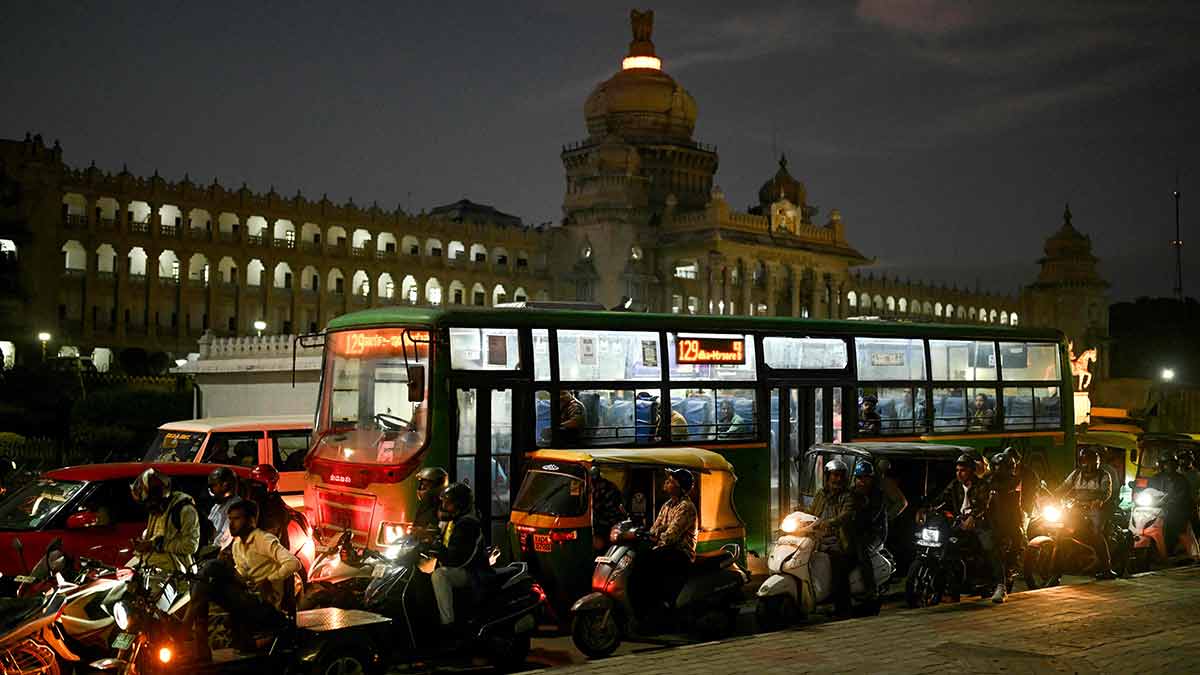Division of Bengaluru city into five corporations: Why BJP, civil society groups oppose Karnataka govt's move
 Standstill city: Traffic jam in Bengaluru. Critics blame delayed local body polls for the city’s infrastructure problems | AFP
Standstill city: Traffic jam in Bengaluru. Critics blame delayed local body polls for the city’s infrastructure problems | AFP
The division of Bengaluru city into five new corporations has stirred controversy, with the BJP alleging it is “unscientific” and “politically motivated,” as the Assembly constituencies represented by BJP MLAs have been broken down and are split between two to three corporations.
The Karnataka government issued a draft notification on July 19 marking the boundaries of the five municipal corporations proposed under the Greater Bengaluru Authority Act. The draft splits the 712 sq km of the existing civic limits (Bruhat Bengaluru Mahanagara Palike) into five smaller corporations based on area, population, population density and projected property tax potential.
While BJP has won 16 out of the 28 Assembly constituencies in Bengaluru Urban district, the draft proposes splitting of at least five Assembly seats —Mahadevapura, Dasarahalli, Rajarajeshwari Nagar, Padmanabha Nagar and Yeshwantpur.
For instance, Padmanabha Nagar, a constituency held by LOP R. Ashok is now split into Bengaluru South and West corporations.
BJP MLA from RR Nagar MLA Munirathna Naidu, whose constituency is divided between three corporations (North, South and West), blamed Deputy Chief Minister D.K. Shivakumar’s “political vendetta” for the delimitation. “It is unscientific, and they (DK Brothers) are avenging D.K. Suresh’s defeat in the Lok Sabha polls by splitting my constituency. My voters will be confused and this will delay the BBMP polls too,” said Naidu.
In the 2015 BBMP (civic) polls, the BJP had won 100 out of 198 wards, while the Congress won 76, JDS 14 and independents 8. The ex-corporators complain that the delimitation of the corporations has created confusion over the civic wards, too and fear that it would not only confuse the voters but also further delay the civic polls, which were last held in 2015.
Even as the BJP MLAs are contemplating a legal remedy, the civil society groups have approached the high court questioning the legality of the Greater Bengaluru Governance (GBA) Act notified by the state government on May 14 this year.
A PIL filed by Kannada film director T.S. Nagabharana and two others urged the court to declare GBA as “unconstitutional”. The petitioners argued that the Act was a blatant attempt by the state government to usurp power from local bodies like BBMP and divert resources to itself. It said the Act violated the democratic spirit of the 74th Amendment, which mandates elected local governments. The BBMP elections had not been held since 2015, and the GBG Act was now being used to delay elections further, the PIL said and sought a direction from the court to conduct the polls within three months.
A division bench of Chief Justice Vibhu Bakhru and Justice C.M. Joshi has issued notices to the state government, BBMP and the state election commission.
The PIL has raised concerns over several sections in the Act (sections 8 to 11, 15, and 316) stating that they erode autonomy of BBMP, sideline elected representatives in favour of bureaucrats and state appointees and give sweeping control to the state government over projects and infrastructure. Sections 14, 18, 21 to 23 give arbitrary powers to the state to reconstitute or dissolve municipalities and redistribute functions, which can lead to delays in elections and subversion of elected governance.
The Act also proposes to split the city into corporations based on their revenue. The total projected property tax across the five corporations is ₹3,427 crore—Bengaluru Central ₹659 crore, East ₹912 crore, North ₹543 crore, South ₹733 crore and West ₹580 crore. Interestingly, the state government has settled for a proposal with a maximum variance of ₹369 crore between Bengaluru East (IT corridor) and Bengaluru North. While the GBA headed by the chief minister is meant to provide grants to help corporations generating less revenue, the opposition parties fear nepotism leading to neglect of the corporations where the opposition members hold sway.
DCM Shivakumar said that BJP was politicising the issue. “We will correct if there is a mistake. But we have had detailed discussions with the BJP leaders on GBA and have formed a Joint House Committee, too.”
India